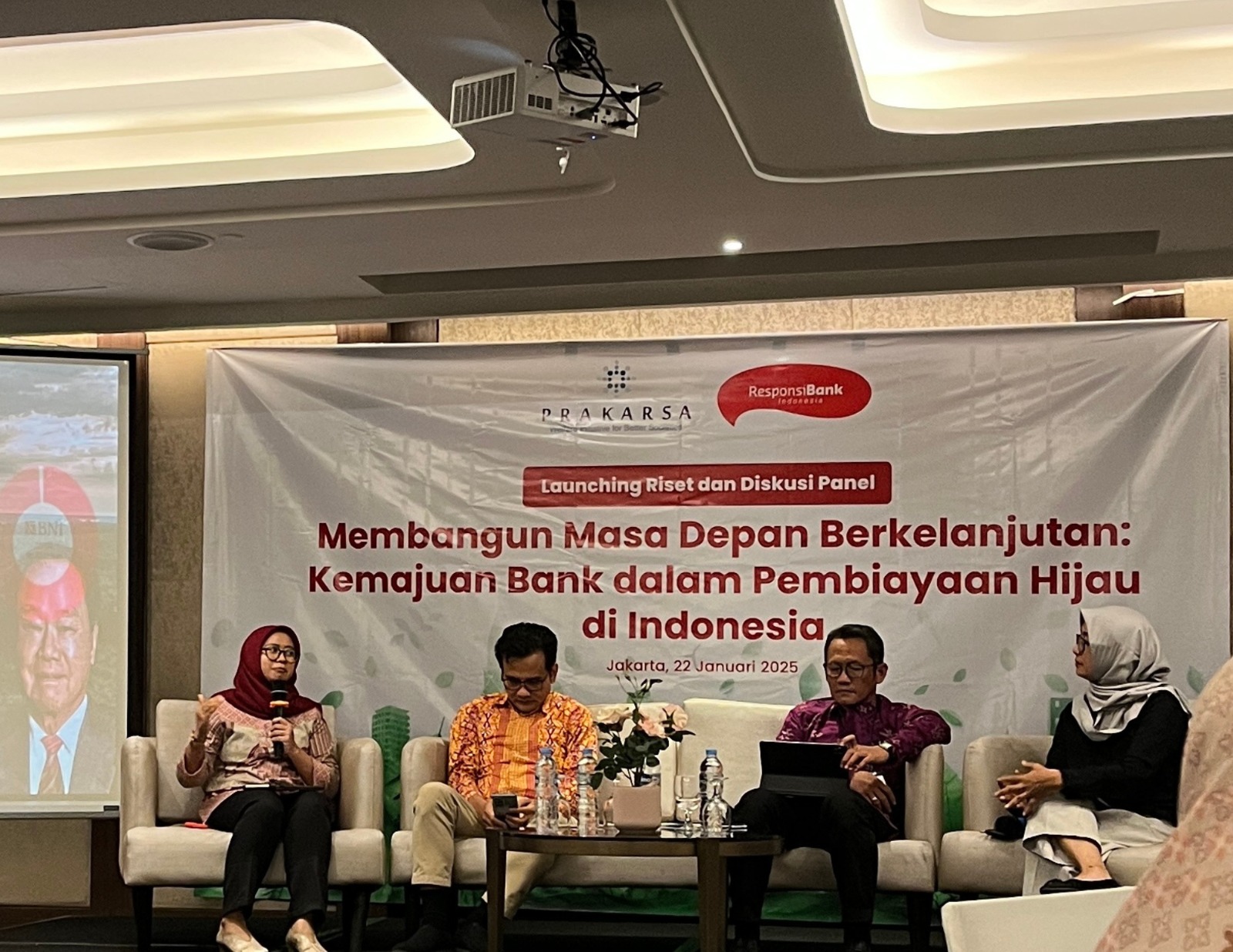24 January 2025 4 menit
Green Promises, Bleak Realities: Revealing The Red In Indonesia’s Financial Industry

Press Release
Jakarta, January 23, 2025 — In contrast to the narrative of sustainable development spun up during international forums, Indonesia’s on-the-ground reality paints a far different picture. In a discussion titled “Building a Sustainable Future: Progress of Banks in Green Financing in Indonesia,” initiated by Responsi Bank, held at Hotel Ashley, Tanah Abang, TuK INDONESIA presented findings highlighting inconsistencies between the commitments written in green policies and the real application of banking practices. The event brought together various stakeholders, including the Financial Services Authority (OJK) and the National Development Planning Agency (BAPPENAS). The event served as a platform to discuss assessments of bank financing policies concerning various sustainability themes.
The transition toward sustainable development, envisioned in the Paris Climate Agreement, still faces major challenges. TuK INDONESIA found that while progressive normative policies exist, they are starkly contradicted by actual practices. The massive financing of natural resource sectors that threaten forests—such as deforestation—demonstrates this inconsistency. According to the Bank on Biodiversity Collapse (BoBC) 2024 report, from the Paris Climate Agreement in 2016 to June 2024, nearly IDR 1,300 trillion in credit has flowed into forest-risk sectors. The majority of these funds have gone to the palm oil and pulp & paper industries, both of which have significant ecological and social footprints.
Indonesia’s major banks play a central role in this financial flow. Bank Mandiri, BNI, BRI, and BCA have been identified as top creditors financing large corporations in these sectors. Companies such as Sinar Mas, controlled by the Widjaja family, and Royal Golden Eagle, controlled by Sukanto Tanoto, are among the biggest beneficiaries, receiving IDR 525 trillion and IDR 126 trillion in credit, respectively. The amount of credit they receive is directly proportional to the vast land areas they control. “This reality underscores the urgent need for the banking sector to drive transformation toward a sustainable economy. Without firm commitments from financial institutions, the risks of deforestation and climate crises will continue to escalate,” stated Linda Rosalina, Executive Director of TuK INDONESIA.
Ironically, the Indonesian Sustainable Finance Taxonomy (TKBI), which should ultimately serve as the main guideline for promoting sustainable financing, had been revealed to contain fundamental flaws. The removal of the red category—which should flag high-risk activities—marked a serious regression in the policy’s substance. Analogous to a traffic stop without a red light, the policy is predicted to lead to potential confusion and casualties in risk assessment for financing. For example, the AFOLU (Agriculture, Forestry, and Other Land Use) sector now only requires sustainability certifications like RSPO to be classified as green.
TuK INDONESIA’s assessment emphasizes how certifications in their own right often do not reflect real conditions on the ground. Many certified companies are still found to be violating regulations and operating illegally. “How can we guarantee sustainability when many do not even meet the basic administrative prerequisites? OJK must re-educate and socialize the green taxonomy to ensure its shortcomings do not lead to setbacks,” Linda affirmed.
The issue goes beyond mere statistics. Impotent green policies such as these ignore the need to prioritize affected communities and the ecosystems of the land they live on. Companies that receive funding despite being proven as human rights violators, for instance, should rightly be categorized as red companies – ineligible for financing. Still, there has yet to be clear regulations addressing this particular problem of leniency for human rights transgressors. Without clear categorization, ensuring that funds do not flow to violators remains a challenge.
TuK INDONESIA also emphasized that financial institutions should not stop at the bare minimum of writing up sustainability reports — they must consistently, transparently, and accountably implement the eight principles of sustainability. Policies must be periodically reviewed to ensure they function effectively. Additionally, grievance mechanisms must remain accessible to the public to ensure that the voices of affected communities are heard, especially given Indonesia’s national commitment to reducing global emissions.
As a concrete step, TuK INDONESIA vows to not stop at criticism. They are currently undergoing procession of a lawsuit against Bank Mandiri over its financing of offending companies such as Astra Agro Lestari and PT Agro Nusa Abadi, which have poor environmental management records. This lawsuit symbolizes resistance against irresponsible financial practices. “Green policies without real implementation are nothing more than empty promises. Banks and companies must be held accountable for the impacts they cause. Indonesia has a huge opportunity to lead in sustainable financing, but this can only happen if we take a firm stance against the violations happening right in front of us,” Linda asserted.
Through this initiative, TuK INDONESIA hopes that the government, financial regulators, and other stakeholders will work together to create policies that are not only ambitious but also have tangible impacts on the ground.
Contact for inquiry:
Annisa (087884446640 / [email protected])
This post is also available in: Indonesian
